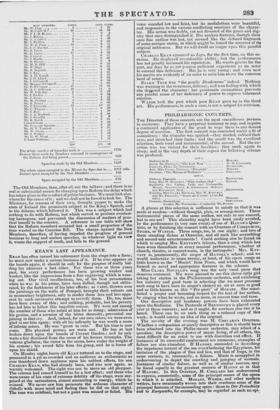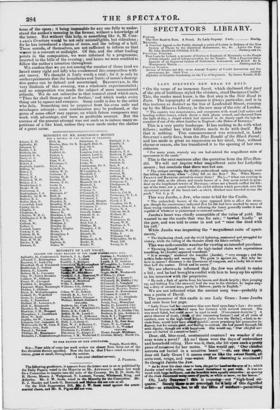• PHILHARMONIC CONCERTS.
THE Directors of these concerts are the most somniferous persons in existence. They have a perpetual tendency to nap, and require a continued application of the goad to urge them to any decent degree of exertion. The first concert was concocted under a fit of somnolency : the stimulus was applied—they started, rubbed their eyes, and stretched their limbs; and the result was the excellent selection, both vocal and instrumental, of the second. But the ex- ertion was too violent for their faculties; they sunk again to sleep; and in the very depth of their repose the following scheme was produced.
ACT I.
Sinfonia in D Nfoz ART,
W. II. CALLCOTT.
Scene, Mr. PHILLIPS, "The Last Masi" Fantasia, Flute, Sir. 'NICHOLSON NICHOLSON. Aria, Miss CT.A RA NOVELL°, "Per pieta"
MOZART.
Overture, The Matins of Wallersee" "
CIIELARD.
Aar Sinfonia, Pastorale TtrEvuovm. Song, Mrs. W. KNYverr, " With verdure clad" .. Quartette, two Violins, Viola, and Violoncello,
Messrs. SrAolver.Errr, A. GRIESBACII, 3Ion..tur, and ItoussELOT, No 5 _BEETHOVEN. Terzetto. Miss CLARA NOVELLO, MPS. W. KNYVETT, tauttnilely. PHILLIPs, "Suave sia vento" (Cosi fen
MOZART.
Overture, Prometheus ltarrilevEN.
Leader, Mr. WEISCHSEL—Conductor, A glance at this selection is sufficient to satisfy us that it was. made at random—without thought, plan, or arrangement. Three instrumental pieces of the same author, not only in one concert„. but in one act ! This absurdity might have been easily avoided,. by the performance (a very rare event) of one of HAvisses Quer- tetts, or by finishing the concert with an Overture of CHERUBINI, SPOHR, or WINTER. Three songs, too, in one night ; and two of them standing dishes at Oratorios, and all such like scrambling and second-rate entertainments ! Could nothing else be found on which to employ Mrs. KNYVETT'S talents, than a song which has been worn threadbare at every musical performance, whether at church, theatre, or concert-room, in the metropolis? Mrs. KNY- VETT is, preeminently, the singer of HANDEL'S school; and we would undertake to name twenty, at least, of his opera songs as little known as the "Moriris" from Teseo, and which would have formed as novel and appropriate features in the scheme.
Miss CLARA NOVELL° s song was the only vocal piece that
deserves comment. We were pleased to see this clever little girl taking her station in the Philharmonic orchestra, and exhibiting her industry and good taste in selecting (for we must presume each song to have been its singer's choice) an air at once so good and so little known as this "Per pieta" of MOZART. She mani- fested a proper and becoming respect for the text of her author, by singing what he wrote, and no more, in correct time and tune.
Our descriptive and laudatory powers have been exhausted upon the Sinfonias. The Pastorale of BEETHOVEN is played every year at these concerts; and so it ought, for nowhere else can it be heard. There can be no such thing as a reduced copy of this work; it would convey no idea of the original.
The novelty of the evening was M. CHELARD'S Overture.
Whether a composition so purely descriptive as this is should have been admitted into the Philharmonic orchestra, may admit of a question; the descriptive power of music being, of all others, the most difficult for an artist to use with discretion and effect. If instances of its successful employment are numerous, examples of failure are also abundant. If HANDEL succeeded in describing the impetuous torrent of the sea overwhelming the Egyptians, his imitation of the plague of flies and lice, and that of frogs, in the same oratorio, is, necessarily, a failure. Music is misapplied in endeavouring to depict the crawling and jumping of animals. Instances of similar failure, as well as of similar success, may be found equally in the greatest oratorio of HAYDN as in that of HANDEL. In this Overture, H. CHELARD has endeavoured to express, connectedly, some of the principal scenes of the opera to which it is attached. MOZART, WEBER, and other modern writers, have occasionally woven into their overtures some of the principal features of the succeeding opera: those to Der Freischiitz and to Euryanthe, for example, may be regarded as each an epi-, tome of the owe; it being impossible for any one fully to under- stand the author's meaning in the former, without a knowledge of the latter. But without this help, ca something like it, M. CHE- LARD'S Overture would be not only unintelligible, but ridiculous ; for he has introduced a chorus of nuns, and the tolling of a bell. These sounds, of themselves, are not sufficient to inform us that ware in a convent at midnight. Of this, and the other leading points in the composition, we were informed by a programme, inserted in the bills of the evening ; and hence we were enabled to follow the author's intention throughout.
We confess that we are not among the number of those (and we leard many right and left) who condemned this composition with- out mercy. We thought it fairly worth a trial ; for it is only by such experiments that the boundaries and limits of music's descrip- tive power can be defined and ascertained. BEETHOVEN, in the very Sinfonia of this evening, was a wholesale experimentalist; and no composition was made the subject of more unmeasured ridicule. We do not subscribe to that musical creed which says, " Thus far shall thou go and no further," and which works every thing out by square and compass. Some credit is due to the artist who fails. Something may be acquired from his even rude and misshapen attempt ; some combination may be produced, or the germ of some effect may appear, on which future composers may work with advantage, and turn to profitable account. But the success of' the present attempt was not such as to induce many re- petitions of a like kind, unless they were made under the shelter of a great name.



















 Previous page
Previous page